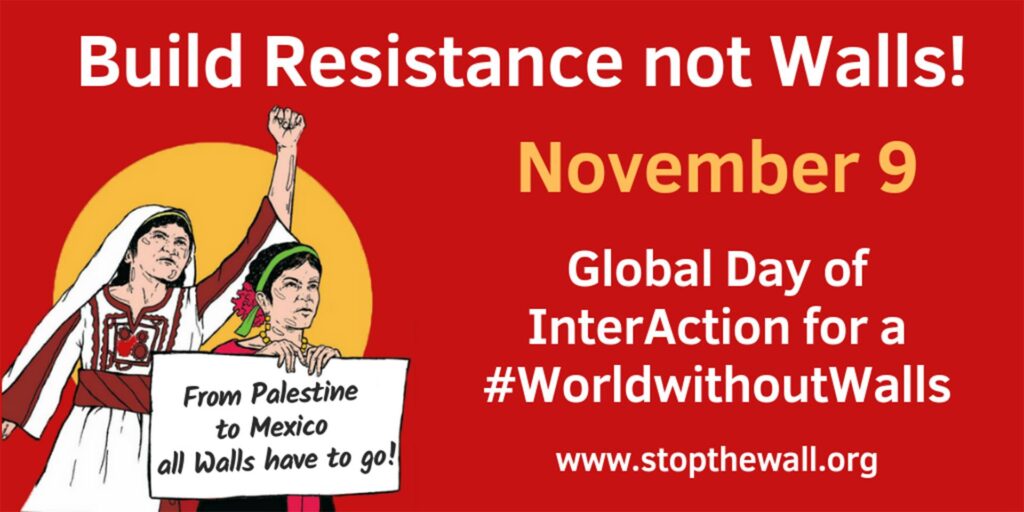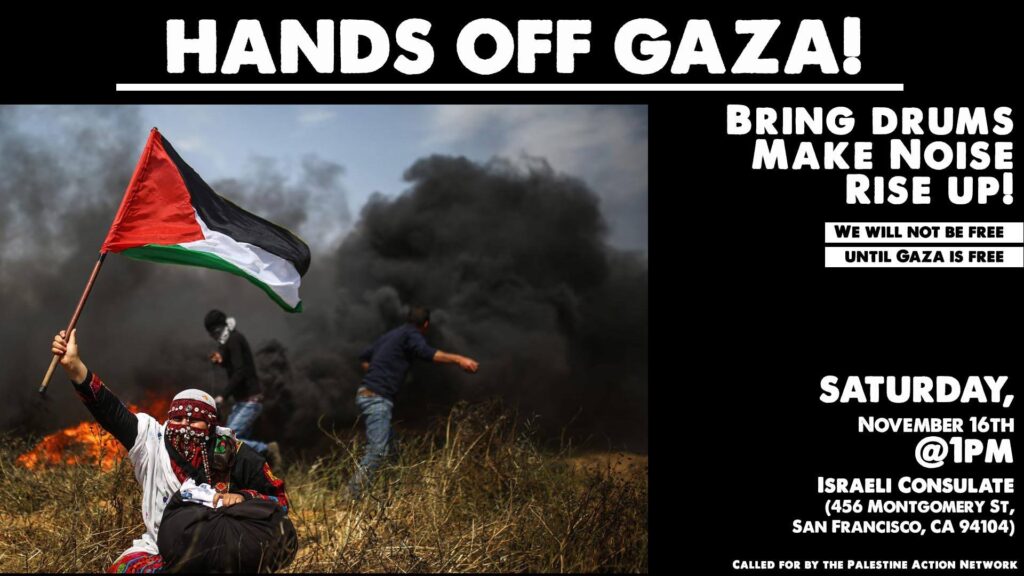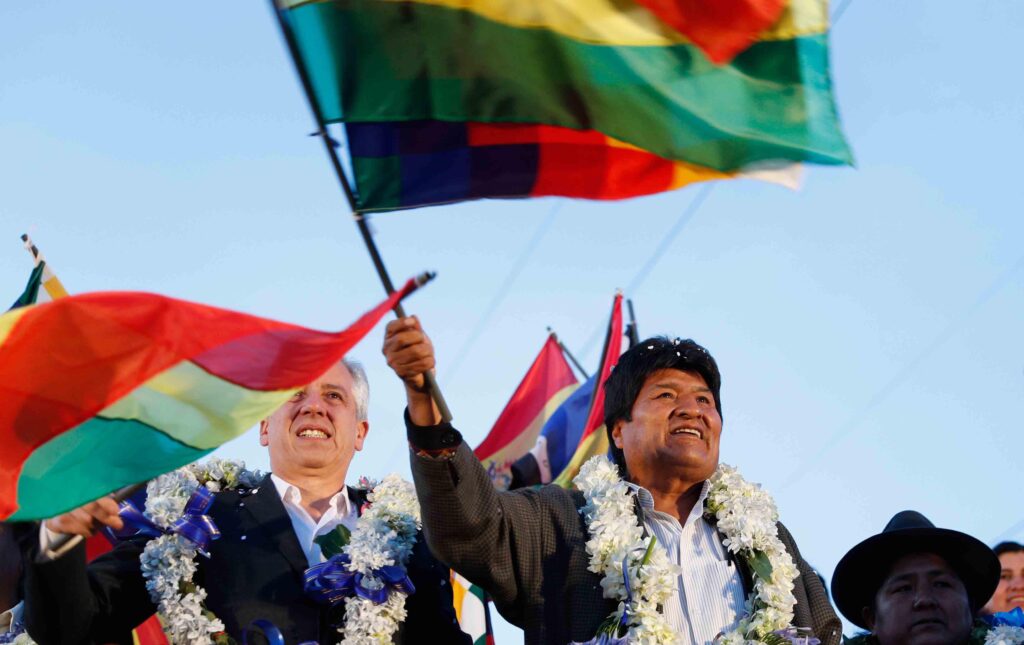Saturday, 9 November
1:00 pm
Potsdamer Platz
Berlin, Germany
Facebook: https://www.facebook.com/events/433129654058663/
 Build Resistance not Walls!
Build Resistance not Walls!
November 9 – Global Day of InterAction for a #WorldwithoutWalls
Be part of a World without Walls: Build ties among movements struggling against physical walls – in Palestine and around the globe – or virtual walls of injustice – including racism, xenophobia, islamophobia, hetero-patriarchy, militarization, climate injustice and more – in your area, your country and invite for a moment of reflection or joint struggle.
2 years ago Palestinian and Mexican movements have launched the call for November 9 – Global Day of InterAction for a World without Walls – a call today endorsed by over 400 organizations, networks and movements across the globe.
This year, November 9 marks 30 years from the fall of the Berlin Wall and 3 years since Donald Trump was elected US president following a campaign promise to build a ‘big, beautiful wall’.
It is now 15 years since the International Court of Justice declared Israel’s apartheid wall on Palestinian land and any aid or recognition to it illegal. Yet, the Wall encaging Palestinian communities is growing and globally walls have become the sign of our times.
It is urgent we continue to join, mobilize and stand together for a World without Walls.
The ever increasing number of walls ripping today physically through the landscapes and within cities are the visual expression of the far-right policies and paradigms of segregation, oppression, exclusion and exploitation that are gaining power from India to the US, from Hungary to Brazil. Israeli apartheid is the ideological model for the rising right, which in turn sustains Israeli occupation through growing military and trade ties.
It is time to unite our struggles for a World without Walls and against a world where rights, life and dignity are granted only to a few, where people and the planet are mere objects of power and domination.
Let’s build November 9 as a space for joint struggle, a moment of reflection on the interconnections between our struggles and the patterns of injustice.
Let’s show that Palestine is not alone in its struggle. Palestine is an integral part of our common struggle for humanity.
For more information, please contact: global@stopthewall.org
9. November – Weltweiter InterAction-Tag für eine #WeltohneMauern
Protestaktion am Samstag, den 9. November 2019 von 13.00 – 15:00 Uhr an den Überresten der Berliner Mauer auf dem Potsdamer Platz.
(English follows German)
Seid Teil einer Welt ohne Mauern: Baut bei Euch Verbindungen zwischen Bewegungen auf, die gegen physische Mauern kämpfen – in Palästina und rund um den Globus – oder zwischen virtuellen Mauern der Ungerechtigkeit – einschließlich Rassismus, Fremdenfeindlichkeit, Islamfeindlichkeit, Heteropatriarchat, Militarisierung, Klimaungerechtigkeit und vielem mehr – und ladet ein zu einer Bewegung der Reflexion oder des gemeinsamen Kampfes
Vor zwei Jahren haben palästinensische und mexikanische Bewegungen den Aufruf zum 9. November – dem globalen Tag der InterAktion für eine Welt ohne Mauern – veröffentlicht. Dieser Aufruf wird heute von über 400 Organisationen, Netzwerken und Bewegungen auf der ganzen Welt unterstützt.
In diesem Jahr begehen wir am 9. November den 30. Jahrestag des Falls der Berliner Mauer. Donald Trump wurde vor drei Jahren nach einem Wahlversprechen, eine „große, schöne Mauer“ zu bauen, zum US-Präsidenten gewählt.
Es ist nun 15 Jahre her, dass der Internationale Gerichtshof die israelische Apartheidmauer auf palästinensischem Gebiet und jede Unterstützung in diesem Zusammenhang oder Anerkennung für illegal erklärt hat. Doch die Mauer, die palästinensische Gemeinden umschließt, wächst und die weltweiten Mauern sind zu einem Zeichen unserer Zeit geworden.
Es ist dringend notwendig, dass wir uns weiterhin zusammenschließen, mobilisieren und gemeinsam für eine Welt ohne Mauern eintreten.
Die ständig wachsende Anzahl von Mauern, die heute physisch Landschaften und Städte zerreißen sind der wahrnehmbare Ausdruck der rechtsextremen Politik und der Paradigmen der Segregation, Unterdrückung, Ausgrenzung und Ausbeutung, die von Indien bis zu den USA, von Ungarn bis Brasilien an Macht gewinnen. Die israelische Apartheid ist das ideologische Modell für die aufstrebende Rechte, die wiederum die israelische Besatzung durch wachsende Militär- und Handelsbeziehungen aufrechterhält.
Es ist höchste Zeit, dass wir uns zusammentun und unsere Kämpfe gemeinsam führen für eine Welt ohne Mauern und gegen eine Welt, in der Rechte, Leben und Würde nur wenigen gewährt werden, in der Menschen und der Planet bloße Objekte der Macht und Herrschaft sind.
Lasst uns den 9. November zu einem Tag für gemeinsame Kämpfe erklären, einen Moment der Reflexion über die Zusammenhänge zwischen unseren Kämpfen und den Strukturen der Ungerechtigkeit.
Lasst uns zeigen, dass Palästina in seinem Kampf nicht allein ist. Palästina ist ein wesentlicher Bestandteil unseres gemeinsamen Kampfes für Menschlichkeit.
Für weitere Informationen wendet Euch bitte an: global@stopthewall.org
Saturday, 9 November
1:00 pm
Potsdamer Platz
Berlin, Germany
Facebook: https://www.facebook.com/events/433129654058663/
Build Resistance not Walls!
November 9 – Global Day of InterAction for a #WorldwithoutWalls
Be part of a World without Walls: Build ties among movements struggling against physical walls – in Palestine and around the globe – or virtual walls of injustice – including racism, xenophobia, islamophobia, hetero-patriarchy, militarization, climate injustice and more – in your area, your country and invite for a moment of reflection or joint struggle.
2 years ago Palestinian and Mexican movements have launched the call for November 9 – Global Day of InterAction for a World without Walls – a call today endorsed by over 400 organizations, networks and movements across the globe.
This year, November 9 marks 30 years from the fall of the Berlin Wall and 3 years since Donald Trump was elected US president following a campaign promise to build a ‘big, beautiful wall’.
It is now 15 years since the International Court of Justice declared Israel’s apartheid wall on Palestinian land and any aid or recognition to it illegal. Yet, the Wall encaging Palestinian communities is growing and globally walls have become the sign of our times.
It is urgent we continue to join, mobilize and stand together for a World without Walls.
The ever increasing number of walls ripping today physically through the landscapes and within cities are the visual expression of the far-right policies and paradigms of segregation, oppression, exclusion and exploitation that are gaining power from India to the US, from Hungary to Brazil. Israeli apartheid is the ideological model for the rising right, which in turn sustains Israeli occupation through growing military and trade ties.
It is time to unite our struggles for a World without Walls and against a world where rights, life and dignity are granted only to a few, where people and the planet are mere objects of power and domination.
Let’s build November 9 as a space for joint struggle, a moment of reflection on the interconnections between our struggles and the patterns of injustice.
Let’s show that Palestine is not alone in its struggle. Palestine is an integral part of our common struggle for humanity.
For more information, please contact: global@stopthewall.org
9. November – Weltweiter InterAction-Tag für eine #WeltohneMauern
Protestaktion am Samstag, den 9. November 2019 von 13.00 – 15:00 Uhr an den Überresten der Berliner Mauer auf dem Potsdamer Platz.
(English follows German)
Seid Teil einer Welt ohne Mauern: Baut bei Euch Verbindungen zwischen Bewegungen auf, die gegen physische Mauern kämpfen – in Palästina und rund um den Globus – oder zwischen virtuellen Mauern der Ungerechtigkeit – einschließlich Rassismus, Fremdenfeindlichkeit, Islamfeindlichkeit, Heteropatriarchat, Militarisierung, Klimaungerechtigkeit und vielem mehr – und ladet ein zu einer Bewegung der Reflexion oder des gemeinsamen Kampfes
Vor zwei Jahren haben palästinensische und mexikanische Bewegungen den Aufruf zum 9. November – dem globalen Tag der InterAktion für eine Welt ohne Mauern – veröffentlicht. Dieser Aufruf wird heute von über 400 Organisationen, Netzwerken und Bewegungen auf der ganzen Welt unterstützt.
In diesem Jahr begehen wir am 9. November den 30. Jahrestag des Falls der Berliner Mauer. Donald Trump wurde vor drei Jahren nach einem Wahlversprechen, eine „große, schöne Mauer“ zu bauen, zum US-Präsidenten gewählt.
Es ist nun 15 Jahre her, dass der Internationale Gerichtshof die israelische Apartheidmauer auf palästinensischem Gebiet und jede Unterstützung in diesem Zusammenhang oder Anerkennung für illegal erklärt hat. Doch die Mauer, die palästinensische Gemeinden umschließt, wächst und die weltweiten Mauern sind zu einem Zeichen unserer Zeit geworden.
Es ist dringend notwendig, dass wir uns weiterhin zusammenschließen, mobilisieren und gemeinsam für eine Welt ohne Mauern eintreten.
Die ständig wachsende Anzahl von Mauern, die heute physisch Landschaften und Städte zerreißen sind der wahrnehmbare Ausdruck der rechtsextremen Politik und der Paradigmen der Segregation, Unterdrückung, Ausgrenzung und Ausbeutung, die von Indien bis zu den USA, von Ungarn bis Brasilien an Macht gewinnen. Die israelische Apartheid ist das ideologische Modell für die aufstrebende Rechte, die wiederum die israelische Besatzung durch wachsende Militär- und Handelsbeziehungen aufrechterhält.
Es ist höchste Zeit, dass wir uns zusammentun und unsere Kämpfe gemeinsam führen für eine Welt ohne Mauern und gegen eine Welt, in der Rechte, Leben und Würde nur wenigen gewährt werden, in der Menschen und der Planet bloße Objekte der Macht und Herrschaft sind.
Lasst uns den 9. November zu einem Tag für gemeinsame Kämpfe erklären, einen Moment der Reflexion über die Zusammenhänge zwischen unseren Kämpfen und den Strukturen der Ungerechtigkeit.
Lasst uns zeigen, dass Palästina in seinem Kampf nicht allein ist. Palästina ist ein wesentlicher Bestandteil unseres gemeinsamen Kampfes für Menschlichkeit.
Für weitere Informationen wendet Euch bitte an: global@stopthewall.org
 Hunger strikes in Zionist prisons, people in Gaza facing massacres. The West demands that people silently accept their own genocide. Western settler colonialism and its racist, inhumane narratives must be exposed. Long live the struggle for freedom, dignity and self-determination in colonized Palestine. Resistance is a duty – our struggles unite!
Hunger strikes in Zionist prisons, people in Gaza facing massacres. The West demands that people silently accept their own genocide. Western settler colonialism and its racist, inhumane narratives must be exposed. Long live the struggle for freedom, dignity and self-determination in colonized Palestine. Resistance is a duty – our struggles unite!
 HANDS OFF GAZA: BAY AREA RISE UP & MAKE NOISE!
HANDS OFF GAZA: BAY AREA RISE UP & MAKE NOISE!

 Join us to demand freedom for Palestinian political prisoners struggling for freedom – and their very lives – in Israeli occupation prisons. Free Derry Corner, 2pm, 9th November 2019
Join us to demand freedom for Palestinian political prisoners struggling for freedom – and their very lives – in Israeli occupation prisons. Free Derry Corner, 2pm, 9th November 2019 Build Resistance not Walls!
Build Resistance not Walls! Bring signs, flags, and banners demanding freedom for Khalida Jarrar, Samer Arbeed, and all Palestinian political prisoners, and an end to PUMA’s support for Israeli settler-colonialism in occupied Palestine!
Bring signs, flags, and banners demanding freedom for Khalida Jarrar, Samer Arbeed, and all Palestinian political prisoners, and an end to PUMA’s support for Israeli settler-colonialism in occupied Palestine! Samidoun Palestinian Prisoner Solidarity Network, of which the Collectif Palestine Vaincra is a member, calls on all supporters of justice in Palestine to mobilize between 8 and 11 November to win the freedom of Palestinian political prisoners struggling for freedom in the prisons of the Israeli occupation.
Samidoun Palestinian Prisoner Solidarity Network, of which the Collectif Palestine Vaincra is a member, calls on all supporters of justice in Palestine to mobilize between 8 and 11 November to win the freedom of Palestinian political prisoners struggling for freedom in the prisons of the Israeli occupation. Freedom for Khalida Jarrar – activist of the Palestinian left, feminist and parliamentarian illegitimately arrested by the Israeli occupation on 31 October
Freedom for Khalida Jarrar – activist of the Palestinian left, feminist and parliamentarian illegitimately arrested by the Israeli occupation on 31 October